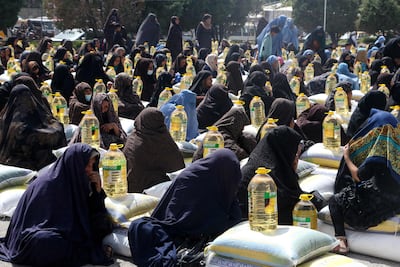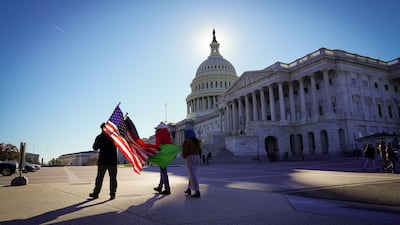The head of the office overseeing Afghanistan reconstruction on Wednesday said he could not say for certain US aid was not going to the Taliban, as he rebuked US President Joe Biden's administration over its “abject refusal” to co-operate with the agency.
John Sopko, Special Inspector General for Afghanistan Reconstruction, released the office's 2023 High Risk List, warning that Washington “faces serious risk due to Taliban interference with UN and US assistance” as well as “a lack of aggressive oversight controls on the trust funds and multilateral organisations”.
“I cannot assure this committee or the American taxpayer that we are not currently funding the Taliban,” Mr Sopko told the House Committee on Oversight and Reform.
Congress created Sigar to provide independent and objective oversight of Afghanistan reconstruction projects and activities.
The special office conducts audits and investigations aimed at preventing waste, fraud and abuse as well as promoting effective reconstruction programmes.
The US has provided about $2 billion in assistance to Afghanistan since the Taliban takeover and recently established a new $3.5 billion “Afghan Fund” to put frozen money to use despite an absence of a trusted financial institution under Taliban control.
Mr Sopko said risks of Taliban interference are in part fuelled by his project encountering an “unprecedented” lack of co-operation from the State Department and the US Agency for International Development.

“The lack of co-operation by … the Department of State, and to a lesser extent USAID, is unprecedented in the nearly 12 years that I have been the Sigar and, I must add, in the two decades that I did congressional oversight,” Mr Sopko told the committee.
He described the dynamic between Sigar's oversight efforts and the State Department as one “in which agencies are allowed to pick and choose what information an IG [inspector general] gets, or who an IG can interview, or what an IG may report on”.
“If permitted to continue, it will end Sigar's work in Afghanistan but also Congress's access to independent and credible oversight of any administration,” he added.
A State Department representative told The National that is has raised questions related to Sigar’s jurisdiction with respect to activities after August 2021, because the US stopped providing assistance for the purpose of the reconstruction of Afghanistan following the Taliban takeover.
"Those questions remain unresolved," the official said.
"Nonetheless, the department and USAID have provided Sigar written responses to dozens of questions, as well as thousands of pages of responsive documents, analyses and spreadsheets describing dozens of programmes that were part of the US government’s reconstruction effort in Afghanistan.
"We are frequently, regularly working with Sigar within the scope of its statutory mandate."
White House Press Secretary Karine Jean-Pierre echoed these sentiments, saying the administration “has consistently provided updates and information” to the inspector general, including “thousands of pages of documents, analysis, spreadsheets and written responses to questions, and hundreds of briefings”.
Sigar has faced increased attention following Mr Biden's 2021 decision to withdraw US forces from Afghanistan after two decades of war there, kick-starting the Taliban's retaking of Kabul.
With the House of Representatives now under the control of the opposition Republican Party, congressional scrutiny of the Biden administration over the withdrawal is ramping up.
Republicans have sought to characterise the Biden administration's actions as a “dereliction of duty”.
Mr Biden and his Democratic Party, meanwhile, blame former president Donald Trump for cutting a deal with the Taliban that all but ensured a hasty retreat under a compressed timeline.
Sigar's own report says actions by both presidents contributed to the chaos of August 2021, but “the stage had been set for that collapse long before — by the failure of the US and Afghan governments to create an independent and self-sustainable ANDSF [Afghan National Defence and Security Forces], despite 20 years and $90 billion of international support”.





